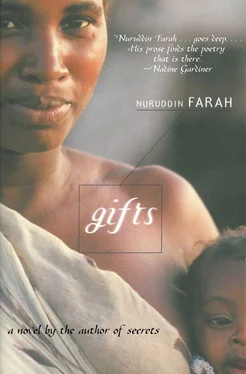Nuruddin Farah - Gifts
Здесь есть возможность читать онлайн «Nuruddin Farah - Gifts» весь текст электронной книги совершенно бесплатно (целиком полную версию без сокращений). В некоторых случаях можно слушать аудио, скачать через торрент в формате fb2 и присутствует краткое содержание. Год выпуска: 2011, Издательство: Arcade Publishing, Жанр: Современная проза, на английском языке. Описание произведения, (предисловие) а так же отзывы посетителей доступны на портале библиотеки ЛибКат.
- Название:Gifts
- Автор:
- Издательство:Arcade Publishing
- Жанр:
- Год:2011
- ISBN:нет данных
- Рейтинг книги:3 / 5. Голосов: 1
-
Избранное:Добавить в избранное
- Отзывы:
-
Ваша оценка:
- 60
- 1
- 2
- 3
- 4
- 5
Gifts: краткое содержание, описание и аннотация
Предлагаем к чтению аннотацию, описание, краткое содержание или предисловие (зависит от того, что написал сам автор книги «Gifts»). Если вы не нашли необходимую информацию о книге — напишите в комментариях, мы постараемся отыскать её.
Gifts — читать онлайн бесплатно полную книгу (весь текст) целиком
Ниже представлен текст книги, разбитый по страницам. Система сохранения места последней прочитанной страницы, позволяет с удобством читать онлайн бесплатно книгу «Gifts», без необходимости каждый раз заново искать на чём Вы остановились. Поставьте закладку, и сможете в любой момент перейти на страницу, на которой закончили чтение.
Интервал:
Закладка:
“How do you put it in reverse?” she asked.
He hesitated and was about to say, “Later,” but he changed his mind and showed her, the car not yet in motion. She repeated all he had told her, including his instructions about how to reverse. After a very heavy pause, she asked, “Are you ready?”
“I am, if you are,” he said, smiling.
“Your safety-belt, please,” she said.
They moved very slowly and after an appropriate lapse she shifted gears, apparently comfortable, with the ease and confidence of someone who had driven for years. Her lips were moving all the time. Was she praying? Or was she rehearsing the sequence of moves she would perform? The truth was surprisingly different, for Duniya kept saying to herself, If Zawadi can, so can I; if lots of stupid men can drive, so can I. All the same, the rest of her body was still like a statue at the centre of a spirited storm.
She stopped the vehicle without being told to. Neither said anything, they listened to the engine idle. Again, without being instructed, she switched off the engine, only to start it again instantly, and to drive further and further away from the circle their car tyres had made. As she slowed down, Bosaaso could discern signs of fatigue on her face.
Maybe it was easy to impress Bosaaso: he was a man in love. She stole a furtive glance in his direction and she thought she had caught his evasive look in the sieve of his gaze. Did he consider her to be foolhardy in taking all this head-on, without fear or worry? Why, Bosaaso had appeared preoccupied at the very moment when she had been most daring. What kind of a man was he? Cautious? Or was he likely to panic?
The car stalled now that she had lost her concentration. Some people cannot help smiling when a car, in which they are being driven by a learner, buck-jumps. Although unaware of it, Bosaaso smiled. To her, the smile was like a stab, and it hurt her. So she started running the engine faster, and then drove round and round until he was visibly worried, frightened. Then she cut off the engine.
Scarcely had he prepared to say something than she turned the key in the ignition and was off, this time reversing. The car buck-jumped. But she didn’t despair. She tried it again, repeating the same process. The rear of the vehicle wouldn’t obey her commands, swerving snakelike, going out of control, never straight as she had wanted it. Because Bosaaso didn’t speak, anxiety welled up inside her, certain that he thought she was being foolish. Finally, she stopped the car.
A long silence.
She remembered when she was four or five, remembered riding Zubair’s Arab stallion. She had taken a fright, for the beautiful horse’s flanks had been too wide-backed. Abshir, her brother, had been with her and she had held on to him, certain that no harm would come her way.
Bosaaso wondered aloud if she would like to practice more.
“Sure,” she said, accepting his offer.
When the car was moving, Duniya recalled a story Zubair, her first husband, had told her about a horse that had gone mad and wouldn’t stop running. The horse grew wings of madness and flew in an easterly direction, towards the sun, as though intending to reach its source. People said that jinns were in the saddle of such horses. Now what if the car refused to stop? What if one of Zubair’s wife’s relatives who are half-jinn and half-human were to take command of the steering-wheel? Not wanting to risk her life and his, she tested the brakes and was relieved to learn that they were in working order.
“Is anything the matter?” Bosaaso asked.
Duniya’s lips gave a tremor of self-blame, and she looked away and at her lap with the apprehensiveness of somebody who didn’t know how to apologize. Bosaaso didn’t want to find out what had upset her and was pleased to swap seats with her when she suggested they do so. He held his curiosity in check, and came round to the driver’s side of the ear, touching her as she shifted over to the passenger’s seat. Bosaaso put the vehicle into motion without saying a word.
When they were driving past Aw-Cumar’s store, where Duniya’s family had an account, she asked him to drop her off and to go ahead and wait for her at home. She gave him the key to let himself in, suggesting that he make himself comfortable if either Mataan or Nasiiba were not at home.
He promised her he would.
Aw-Cumar’s shop was a small six-by-ten cubicle, criss-crossed with wooden counters running from one end of the wall to the other, with a fold-away counter serving both as table and barrier. Beans, com, salt were visibly laid out in flat-bottomed boxes. The counter was as high as Duniya’s navel. There wasn’t anyone in the store today and she wondered where Aw-Cumar might be.
Then she heard his praying whispers, a sequence of sounds familiar to Muslims all the world over, consisting mainly of a stream of allit-eratives in the letter S, as part of the Bismillaahis without which prayers are considered sacreligious. Oblivious to what she was doing, she leaned against a ramshackle structure into whose wooden frame Aw-Cumar had hammered nails, so as to discourage idle-talkers from supporting their elbows on it while they held forth, wasting his time. Duniya made a pained sound when the nails pricked her, and hoped she didn’t irritate Aw-Cumar.
She discovered a moment later that she did not. He emerged from below the counter, issuing a salvo of Koranic blessings. When he rose to his full height, he was a mere five feet tall. Duniya didn’t respond immediately, letting the cluster of prayer-consonants clash and explode in the finale of a Semitic cacophony, conscious of the smile framing his friendly face. Islamic etiquette demanded that a woman not come into bodily contact with a man currently in communication with his Creator, women being impure. She held her ground and waited.
He saluted her several times, albeit from a civic distance. Before long he was saying, “Please accept my belated condolences for the premature passing away of the foundling. May God’s blessing be on your house, Amen!”
She didn’t know why she felt ridiculous, but she did. And she thanked him.
He uttered several more salvos, then touched his face with his forefingers; a little later his cupped hands moved down towards his chin, praying all the time, his lips astir with the letter S and on their heels a number of Arabic gutturals. Aw-Cumar proffered his hand at last, a hand which was soft and of an extraordinary roundness, no joints, no cartilage or bone anywhere. In fact he gave away his whole wrist as though he wished one to keep it for him while he dealt with some other business more lucrative than a hand-clasp. Duniya remarked to herself that he had a bracelet of extra flesh around what might once have been a wrist. And a circular expanse of finger-nails. “What can I do for you?” he said, his hand in hers, and as though he wouldn’t want it back.
“I’ve come to pay my respects, since I haven’t called round for a long time, and also to find out the situation with my account,” she said.
“It’s very kind of you,” he replied.
Meanwhile Duniya’s eyes went past him to take in the shop. In these days of galloping inflation, famines, foreign currency restrictions and corrupt market transactions, shops like Aw-Cumar’s had two opposing attitudes towards their clients. There were those whom they treated with special benevolence and to whom they sold hard-to-obtain goods. And there were those to whom they displayed empty shelves, to whom, shaking their heads, the store-owners would say that such and such an item had not been available on the market for months or years, whichever was the more credible. Duniya belonged to the category of customers whom he favoured. Moreover Aw-Cumar was attached to the twins, especially Nasiiba, with whom he often dealt, whose moods he could read, and from whom he occasionally bought some of Duniya’s US dollars at a concessionary rate.
Читать дальшеИнтервал:
Закладка:
Похожие книги на «Gifts»
Представляем Вашему вниманию похожие книги на «Gifts» списком для выбора. Мы отобрали схожую по названию и смыслу литературу в надежде предоставить читателям больше вариантов отыскать новые, интересные, ещё непрочитанные произведения.
Обсуждение, отзывы о книге «Gifts» и просто собственные мнения читателей. Оставьте ваши комментарии, напишите, что Вы думаете о произведении, его смысле или главных героях. Укажите что конкретно понравилось, а что нет, и почему Вы так считаете.











